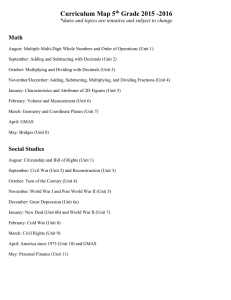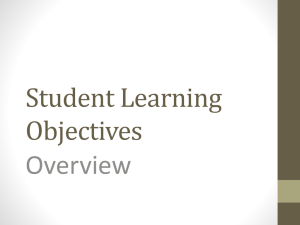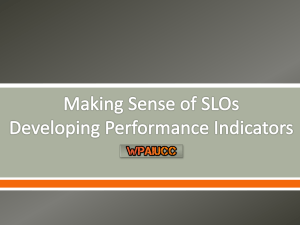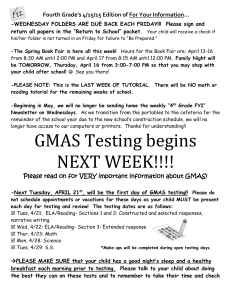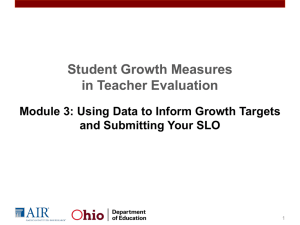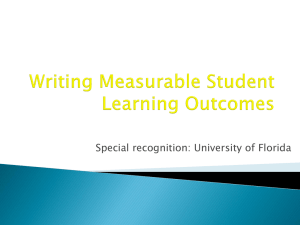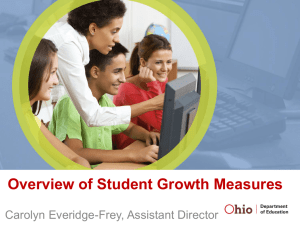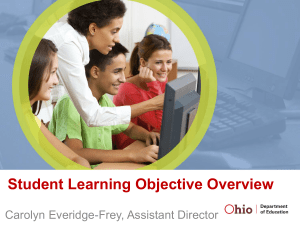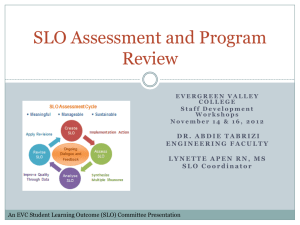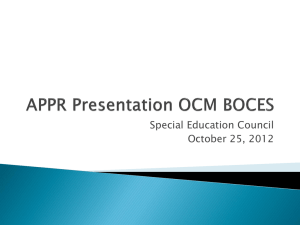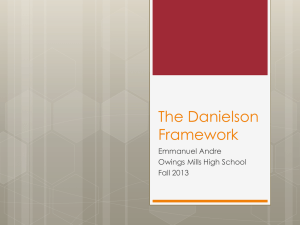GMAS Parent Powerpoint - Clayton County Public Schools
advertisement
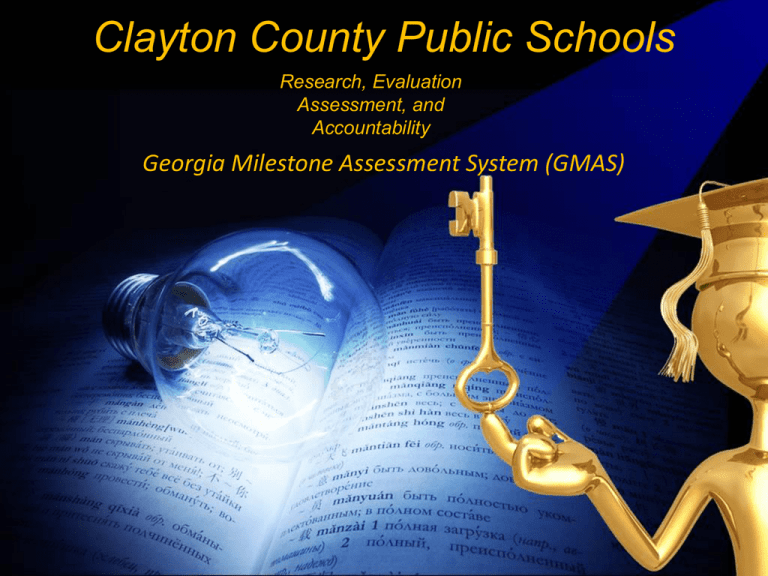
Clayton County Public Schools Research, Evaluation Assessment, and Accountability Georgia Milestone Assessment System (GMAS) What are the Georgia Milestone Assessments (GMAS)? • Georgia Milestones is a comprehensive summative assessment program that measures how well students have learned the knowledge and skills outlined in the stateadopted content standards in language arts, mathematics, science, and social studies. • It offers rigor in all content areas and raises the level of expectations for students and teachers. • GMAS will provide a better indication of college and career readiness and preparedness for the next grade level. What grade bands and courses do (GMAS) encompass? • Students in grades 3 through 8 will take an end-of-grade assessment in each content area, while high school students will take an end-of-course assessment in the following: • 9th Grade Literature and Composition • American Literature and Composition • Coordinate Algebra • Analytic Geometry • Physical Science • Biology • US History • Economics What are the features of GMAS? • open-ended (constructed-response) items in language arts and mathematics (all grades and courses); • a writing component (in response to passages read by students) at every grade level and course within the language arts assessment; • norm-referenced items in all content areas and courses, to complement the criterion-referenced information and to provide a national comparison; • online administration over time, with online administration considered the primary mode of administration and paperpencil as back-up until the five year transition is complete. What are the benefits of GMAS? • Computer-based assessments are more efficient, innovative, and engaging. • During the next few years, assessments will provide results more quickly and in an increasingly readable and easy-to-understand format. • Parents can use this information to better communicate with teachers and school administrators about their child’s progress, and teachers can use it to better tailor instruction to the child’s needs. • New assessments will allow Georgia to compare student performance across schools and districts statewide, as well as provide information about how Georgia students compare with their peers nationally. • The new assessments will be designed to provide accurate measures of achievement and growth for all students, including those with disabilities and English learners. Test administration accommodations will be available for eligible students, when needed. What to expect in Language Arts? • Use analytic reading to construct meaning, make inferences, draw conclusions, compare and contrast ideas, themes, etc. • Synthesize ideas and concepts across multiple texts Take your • Develop informative/ explanatory responses or narratives, child–to the evidence from text(s) and produce opinions/arguments citing library using standard language conventions, etc. • Read sufficiently complex and lengthy text independently • Read widely and deeply from among a broad range of highquality, increasingly challenging literary and informational texts • Analyze how two or more texts address similar themes or topics in order to build knowledge or to compare the authors’ approaches What to expect in Mathematics? • Demonstrate conceptual understanding, procedural skills and fluency, problem solving, modeling, and mathematical reasoning your (Parts A, B and C) • Complete multi-stepHave problems child count of their work for math • Show and provide explanations money and problems make change • Model real-world problems • Solve problems: content and mathematical practice • Have fluency with mathematics • Reason abstractly and quantitatively. • Construct viable arguments and critique the reasoning of others. What to expect in Science? • Demonstrate understanding of the core concepts, ideas, and practices of science to explain scientific phenomena – with content and Characteristics of Science/Nature of Science Take nature standards serving as co-requisites walks with • Establish relationships between science, our environment, and your child our everyday world • Demonstrate scientific literacy • Embrace scientific inquiry both in and out of the classroom • Apply critical-thinking skills What to expect in Social Studies? • Demonstrate an understanding of the past and its influence on the present and future – • Demonstrate the interconnectedness of history, culture, Discuss geography, economics, and government/civics current events • Use critical thinking, problem solving, and participatory skills with your to become engaged citizenschild • Identify elements of culture as well as similarities and differences among cultural groups across time and place through experience, observation, and reflection • Demonstrate an understanding of the foundations of political thought, and the historical development of various structures of power, authority, and governance. How will my child need to show their work? Explain their thinking How will my child need to show their work? Constructed Response How will the explanation be scored? What are the GMAS testing dates? Elementary and Middle schools will test April 14-April 27 High schools will test April 27-May 8 What if my child is not enrolled in any of the GMAS tested grade levels or courses? • Students not enrolled in any of the GMAS grade level or courses (e.g. kindergarten, first, second, art, music, physical education, world history, chemistry) will be administered a Student Learning Objective (SLO). • SLOs are district-wide measurable, long-term academic SMART goals set to determine student growth. • Specific • Measureable • Appropriate • Realistic • Time-Bound • The primary purpose of SLO’s is to improve student achievement in the classroom. • SLO assessments are aligned to the curriculum and focus on student growth. When are SLOs administered? • SLOs are administered twice a year. • SLOs are administered during the first semester of the school year (September). This is referred to as the pre-assessment. • SLOs are administered during the second semester of the school year (May). This is referred to as the post-assessment • Comparisons are made between the pre-assessment and post-assessment scores to determine if students showed growth during the school year. Research, Assessment, Accountability, and Evaluation Our aim is to provide on-time, accurate, research-based accountability data and assist stakeholders in analyzing, interpreting, and communicating the results that will foster academic success for all students. Contact Information Delphia Young, Ed.D. Executive Director of Research, Evaluation, Assessment, and Accountability Natasha Jefferson, Ed.D. Coordinator of Student Assessment Zawdie Jackson, Ed.D. Data Management Specialist Moises Payamps SLO Specialist
